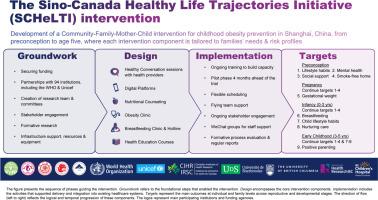设计和实施SCHeLTI试验社区-家庭-母亲-儿童肥胖预防干预的分步方法
IF 1.9
Q2 MULTIDISCIPLINARY SCIENCES
引用次数: 0
摘要
本文描述了制定和实施中加健康生活轨迹倡议(SCHeLTI)干预措施的方法,该干预措施是世界卫生组织支持的通过四项国际随机对照试验预防儿童肥胖的一部分。SCHeLTI是上海的一项多中心、集群随机试验,支持4500个家庭从孕前到孩子5岁。这种社区-家庭-母亲-儿童干预措施包括协调的组成部分,如健康对话会议、营养咨询、母乳喂养支持、肥胖诊所以及针对关键生殖和发育阶段及风险概况的教育课程。在实施科学原则的指导下,SCHeLTI的发展经历了四个主要阶段:1)建立概念基础(理论框架、结果、逻辑模型);2)建立交付基础设施,让利益相关者参与形成性研究;3)确定适合家庭需求的干预设计;4)实施干预措施,包括能力建设、适应和过程评价策略。•基于实施科学原则的四阶段发展过程指导干预设计和交付•量身定制的组件与生殖和发育阶段以及风险概况相一致,以支持整个生命过程中的家庭和儿童需求•利益相关者参与和迭代适应确保了上下文相关性和可行性本文章由计算机程序翻译,如有差异,请以英文原文为准。

A stepwise approach to designing and delivering the SCHeLTI trial community-family-mother-child obesity prevention intervention
This paper describes the methods for the development and implementation of the Sino-Canadian Healthy Life Trajectories Initiative (SCHeLTI) intervention, part of a World Health Organization-supported effort to prevent childhood obesity through four international randomized controlled trials. SCHeLTI is a multi-center, cluster-randomized trial in Shanghai, supporting 4500 families from preconception through the child’s fifth year. This Community-Family-Mother-Child intervention includes coordinated components such as Healthy Conversation sessions, nutrition consultations, breastfeeding support, an obesity clinic, and educational courses tailored to key reproductive and developmental stages and risk profiles. Guided by implementation science principles, SCHeLTI’s development followed four main phases: 1) establishing the conceptual foundation (theoretical framework, outcomes, logic model); 2) building delivery infrastructure and engaging stakeholders in formative research; 3) finalizing the intervention design tailored to families’ needs; and 4) implementing the intervention, including capacity building, adaptation, and process evaluation strategies.
- •A four-phase development process grounded in implementation science principles guided intervention design and delivery
- •Tailored components align with reproductive and developmental stages and risk profiles to support family and child needs across the life course
- •Stakeholder engagement and iterative adaptation ensured contextual relevance and feasibility
求助全文
通过发布文献求助,成功后即可免费获取论文全文。
去求助
来源期刊

MethodsX
Health Professions-Medical Laboratory Technology
CiteScore
3.60
自引率
5.30%
发文量
314
审稿时长
7 weeks
期刊介绍:
 求助内容:
求助内容: 应助结果提醒方式:
应助结果提醒方式:


